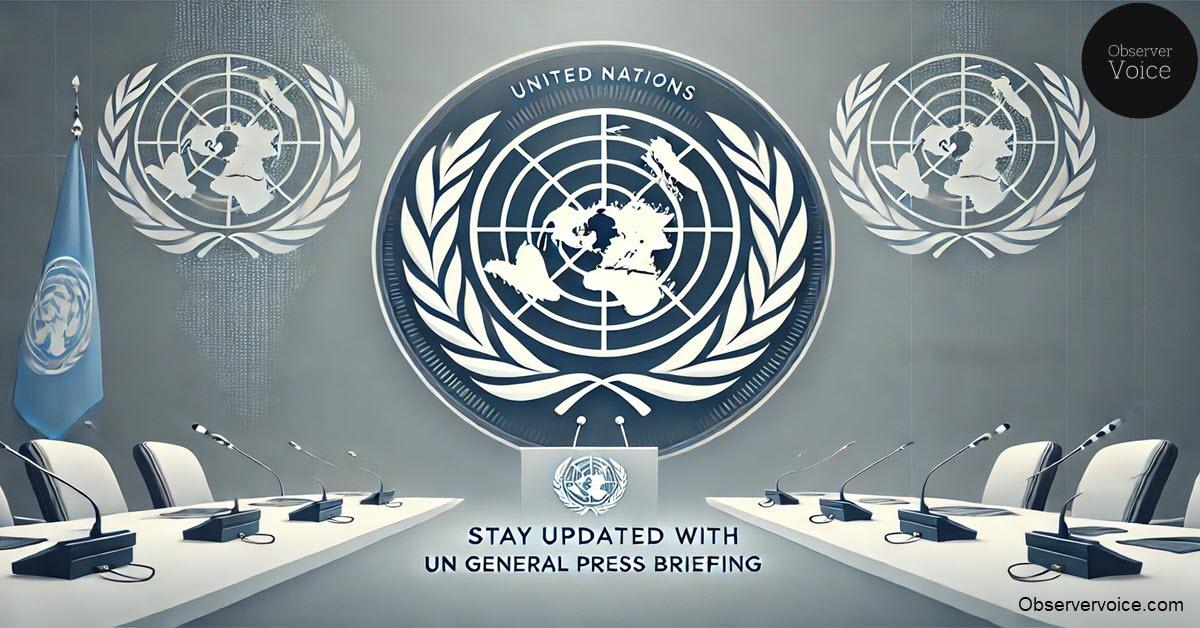Global Cooperation for Ocean Sustainability

The United Nations General Assembly convened today to emphasize the critical role of oceans in sustaining life on Earth. The assembly discussed the Secretary-General’s report on the importance of maintaining a healthy, sustainable, and rules-based global marine environment. Delegates from various nations underscored the need for international cooperation to tackle the pressing challenges facing the world’s oceans. These challenges include climate change, pollution, and overfishing, which threaten marine ecosystems and the livelihoods of millions.
The Importance of International Collaboration
Delegates highlighted the necessity of global cooperation in addressing the myriad challenges facing the oceans. They stressed the importance of utilizing existing international agreements and legal frameworks to foster harmonious coexistence among nations. The representative of Portugal, speaking on behalf of the Community of Portuguese-Speaking Countries, pointed out the urgent need for concerted international action. He noted that rising sea levels, warming waters, and increasing marine pollution require a collaborative approach. His group of countries is committed to sharing best practices and promoting research partnerships to address these issues effectively.
Furthermore, the representative from Cyprus emphasized the United Nations Convention on the Law of the Sea (UNCLOS) as a guiding force for sustainable ocean management. Cyprus has aligned its national maritime legislation with UNCLOS and is dedicated to resolving maritime disputes peacefully. This commitment to multilateralism is crucial for ensuring the equitable stewardship of the world’s oceans. The European Union, represented as an observer, echoed these sentiments, expressing concern over the declining health of the oceans due to climate change and pollution. The EU representative called for urgent action to address these threats, reinforcing the need for cooperation among all states.
Navigational Rights and Maritime Disputes
The assembly also addressed the critical issue of navigational rights and maritime disputes. The representative of the United States emphasized the importance of upholding navigational freedoms, especially in light of attempts to impede lawful maritime activities. She called on all states to resolve territorial and maritime disputes peacefully, particularly regarding the South China Sea. The U.S. expressed concern over what it termed “expansive and unlawful maritime claims” in that region, urging adherence to the principles outlined in UNCLOS.
The Philippines’ delegate echoed these concerns, highlighting the “ocean emergency” faced by his nation. He condemned China’s recent actions regarding maritime baselines in the South China Sea, asserting that only the Philippines has the right to establish baselines in its territorial waters. In contrast, China’s representative argued that the assembly is not the appropriate forum for discussing the South China Sea issue. He maintained that China’s position is consistent and firm, rejecting any claims that undermine its sovereignty. This ongoing disagreement underscores the complexities of maritime governance and the need for diplomatic dialogue.
Economic Benefits of a Healthy Ocean
Several delegates emphasized the material and economic benefits of preserving a healthy ocean environment. The representative from Indonesia highlighted the ocean’s role in global food security and called for innovative technologies to ensure sustainable food supply chains. He stressed the importance of international partnerships to develop cost-effective solutions that reduce nutritional and economic losses.
Monaco’s delegate shared his country’s commitment to innovative solutions for ocean preservation, particularly in protecting fragile species like red coral. He noted that Monaco is actively working on projects to process toxic algae into useful compounds for agroforestry. The representative from the Marshall Islands also highlighted the importance of sustainable partnerships with the private sector, showcasing an agreement with Walmart to supply certified sustainable canned tuna. These initiatives demonstrate how a healthy ocean can contribute to economic prosperity while ensuring environmental sustainability.
The Role of Scientific Information and Community Engagement
Accurate scientific information is vital for effective ocean governance. Costa Rica’s delegate emphasized the need for true and neutral information from all UN entities. She called for the active participation of small island developing states in discussions about ocean policies. The upcoming UN Oceans Conference, hosted by Costa Rica and France in 2025, presents an opportunity for all nations to engage at the highest level.
Moreover, the representative from Tonga, speaking for the Pacific Islands Forum, highlighted the region’s dependence on its vast ocean resources. He welcomed recent resolutions aimed at addressing plastic pollution and commended progress in developing legally binding international instruments. The Pacific Islands Forum’s commitment to protecting their natural environment underscores the importance of regional cooperation in ocean governance.
Observer Voice is the one stop site for National, International news, Sports, Editor’s Choice, Art/culture contents, Quotes and much more. We also cover historical contents. Historical contents includes World History, Indian History, and what happened today. The website also covers Entertainment across the India and World.

